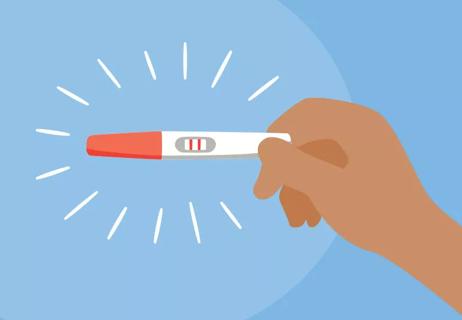How a BMI in the overweight or obesity range affects ovulation and how to increase fertility

Break out the baby onesies! You finally feel like it’s the right time to create a mini-you … but as the months pass without a positive pregnancy test, your patience starts to wane. What could the problem be? And could your weight be impacting your ability to conceive?
Advertisement
Cleveland Clinic is a non-profit academic medical center. Advertising on our site helps support our mission. We do not endorse non-Cleveland Clinic products or services. Policy
Losing even 10 pounds could make a difference in your ability to get pregnant. Ob/Gyn Rebecca Starck, MD, breaks down the connection between weight and fertility, including what you can do to give your body the best possible chance at pregnancy.
Yes, having obesity or significant overweight may make it harder to get pregnant.
“It’s a complex dance between the hormones that trigger ovulation and your progesterone and estrogen levels,” Dr. Starck explains. “Fat cells often produce higher estrogen levels, which can work against your body when it’s trying to ovulate.
In other words, having obesity can disrupt your reproductive health, which can make it harder to get pregnant.
And while out-of-balance hormone levels don’t always mean you’ll have trouble getting pregnant, you may experience less regular ovulation and menstrual cycles — which can make it harder to conceive.
Having central obesity, which refers to weight around the abdomen, is generally considered higher risk for ovulation difficulties and diabetes — which can, in turn, impact your ability to get pregnant.
You may have central obesity if you are “apple-shaped,” for example, meaning you carry most of your weight in your stomach.
Advertisement
“If you carry more weight proportionally or in their lower extremities or butt tend to have a little less risk,” Dr. Starck says. “They may be genetically wired to have that body type, while central obesity is often the result of lifestyle and habits.”
Doctors use body mass index, or BMI, to determine if a person has obesity or overweight. BMI uses height and weight to calculate body fat. It’s a numbers game: A BMI between 25 and 30 is considered overweight, and a BMI over 30 is considered obesity.
The conversations and concerns about BMI are more complex than that. But when it comes to trying to conceive, BMI is still a good place to start.
“To optimize your health before and during pregnancy, we recommend aiming for a BMI below 25,” Dr. Starck says, “but the healthiest BMI for pregnancy is different for everyone.”
Someone in the ideal BMI range may have a hormonal imbalance that causes irregular ovulation. Another may technically have obesity but ovulates every month and has regular periods, resulting in a higher chance of pregnancy.
“There are all sorts of factors involved in both weight loss and conception,” Dr. Starck says, “so while there is no magic number, 10 pounds is a good place to start.”
To help you reach your goal, focus on making healthy choices every day. That can sometimes make all the difference in helping your body start to ovulate regularly.
Dr. Starck encourages her patients to focus on balancing their diet before trying to conceive. “But try not to focus too much on the end goal, which can be overwhelming,” she warns.
Focus on doing something healthy every day:
Just don’t fall for diet trends that claim to offer a quick fix for weight loss.
“As a longtime Ob/Gyn, there’s nothing harder than the yo-yo dieting I see attempted year after year,” Dr. Starck says. “A fad diet will never be as effective as healthy habits.”
Balance healthy diet habits with rigorous exercise most days of the week — the kind that gets your heart rate and pulse up.
If you’ve never exercised before, try to find at least one activity you truly enjoy, which will help you gain and maintain momentum. Work on starting an exercise routine that includes a warm-up, a conditioning phase and a cool-down phase.
Advertisement
Making healthy lifestyle changes and trying to lose weight can be hard, but you don’t have to do any of it alone. Talk to your doctor or a nutritionist, who can help you plan a healthy diet and create a doable exercise plan.
“Get your partner on board, too, by planning menus or signing up for an exercise class together,” Dr. Starck suggests.
A medication called metformin is often prescribed if you have Type 2 diabetes or aren’t ovulating. Although it can help, it’s not a cure-all.
“Achieving a healthy body weight has a much better payoff, especially with all the risk factors that come with being overweight and pregnant,” Dr. Starck says.
Reaching a healthy weight may help you conceive and will lead to a smoother overall pregnancy. And even if you know you don’t want kids for years down the road, embracing healthy habits now will put you in the best possible position for pregnancy when the time comes.
“I’m a firm believer in prevention and developing good lifestyle habits at a young age,” Dr. Starck says. “Working on developing healthy diet and exercise habits will benefit you throughout your life.”
It’s never too early (or too late) to make smart, sustainable lifestyle choices that will keep you — and your future family — healthy and strong.
Advertisement
Learn more about our editorial process.
Advertisement

While it’s probably not your most fertile time, it is possible to get pregnant if you have unprotected sex during your period

While 80% of women will get pregnant within six months, age and other factors make a difference

A fertility specialist talks timeline, diet and other prep steps

The short answer from an Ob/Gyn

An Ob/Gyn explains the question of timing

Maintaining a healthy weight, focusing on exercise and eating a well-balanced diet can improve your overall metabolic health

This diabetes medication can treat obesity, but it’s not for people who just want to drop a few pounds

Successful weight loss takes a long-term commitment — build a healthy lifestyle you can stick with

The tropical fruit is a good source of antioxidants and vitamin C

Most people fall asleep within 10 to 20 minutes, but if your experience is different, adjusting your sleep schedule may help

Exploring your hidden side can lead to better understanding of what makes you tick